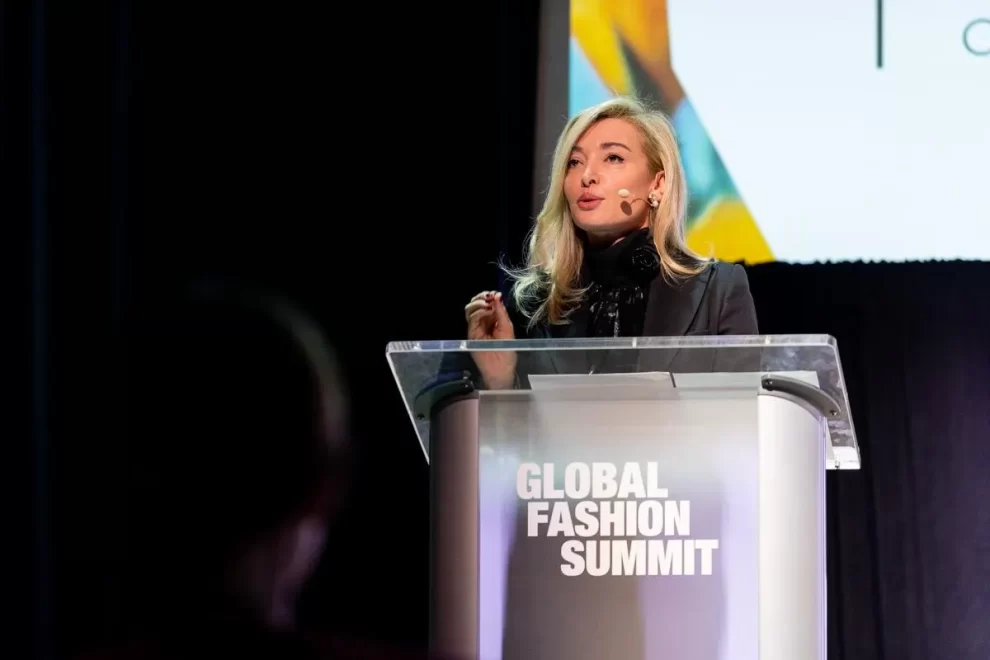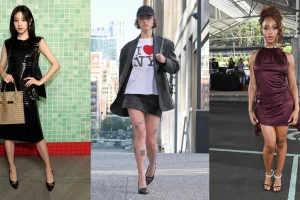The Global Fashion Summit: Boston Edition, held on September 27 in Boston, Massachusetts, at the Revere Hotel Boston Common in the downtown area, brought together prominent fashion experts, industry leaders, and stakeholders to gather in conversation, fostering sustainability and a net-positive impact within the fashion industry. Since 2009, the Global Fashion Agenda, based out of Copenhagen, has been a strategic forum designed to bring together innovators and advocates for sustainable fashion as a normative practice.

In Boston, the Global Fashion Agenda (GFA), a non-profit organization, created a platform for textile and technology companies to display their latest engineering in garment construction, waste processing, management, regeneration, and data analysis. Companies included textile companies Cane Denim, Infinite Fiber Company, circular companies Recurate, Positive Material, InResST, Upcycle Labs, and tech-based companies Inspectorio, Sourcemap, The ID Factory, Waste3Wear, and Worldly, had opportunities to deconstruct and simplify the complex ecosystem of sustainable fashion.

The GFA hosted for the first time in North America, introducing the theme ‘Ambition to Action.’ Panel discussions and fireside chats explored critical topics such as policy, finance, appropriation, and retail, bringing together key players from the fashion and interlinked industries to address pressing sustainability challenges and collaborate on sustainable solutions. Even brands such as SHEIN had representatives in attendance to gather an understanding of the landscape of sustainability.

The event also introduced the GFA Policy Matrix: Americas, summarizing key legislation impacting the textile industry across North, Central, and South America. This legislation complements the EU version and summarizes laws that affect the textile industry. During her panel discussion, Maria Luisa Martinez Diez, Public Affairs Director of the GFA, provided valuable insights into this initiative.

The pinnacle of the Global Fashion Summit: Boston 2023 was its Fashion CEO Agenda 2023. This concise report outlines the development and implementation of leadership strategies that lead to a net-positive global fashion fashion sector. Detailing actionable areas for brands, retailers, and producers providing a roadmap for positive change, Federica Marchionni, CEO of GFA, and Holly Syrett, Director of Impact Programmes & Sustainability of GFA, is fostering a narrative that works with business models across the globe.

CEO Marchionni and associates, organized the physical event in Boston as a business hub that can create capitalist action on sustainable futures. Marchionni affirms, “Our mission is to mobilize, as you can see. We do that mainly with our summit but also with our reports. Advocate for changes in legislations because we push the industry to change but the pace [has been] slow, so we need to tackle that in different ways.”

One of those ways is what has fostered the limitations of wasteful practices within the fashion industry and global textile sector. She continues, “So pushing for more legislations, but also advocacy, [and] work. We [are] also harmonizing the policies – because we are based in Denmark, we’re closer to the European community.”

“Product that is created with fabric, for example, in Asia, and then maybe produced in Europe, and maybe sold in the US – consumer needs to know what is the carbon footprint. What we do most is not only influencing but educating. We need to educate media because the media then educates consumers.”

There are many notable ways that Marchionni has implemented change among textile companies and adjacent brands, but the forum opened up the nuances and challenges to a curated fashion audience. “We are focusing more on smart material choices and resource stewardship, which means less use of water and land, more use of materials that are biodegradable, or recyclable and go back into the circularity [of the supply chain].”

A panel discussion with the founder of branded recommerce company Trove, Andy Ruben, joined by executives from Worldly and Paul Dillinger of Levi Strauss & Co detailed the resale market for the titled “Resale’s Role in Decarbonizing Fashion” chat. The focus was on the potential of resale initiatives to facilitate brand expansion – reclaim aftermarket profits of circulating merchandise – while also reducing the fashion industry’s carbon footprint. Trove, and similar company Recurate, insist brands reconsider how they look at the secondary market for reclaiming brand identity.

Other panel discussions featured prominent fashion figures from various fashion communities, including hat maker Lehi Thunder Voice Eagle of the indigenous community, influencer Domoniw Drakeford, and MIT professor Yuly Fuentes-Medel, and Beth Esponnette, founder of Unspun, to name a few. In addition, the forum marked the launch of an engaging online series, “Fashion Redressed,” focusing on the creative and sustainable aspects of the fashion industry. This series highlights the role of media in supporting indigenous causes and mentions a video collaboration with the BBC that addresses appropriation in fashion.

The essential component of the forum was the Innovation Forum, which connected fashion companies with sustainable solution providers across the value chain. The Innovation Forum facilitated attendees in accessing concrete tools for driving sustainability actions. The Global Fashion Agenda is building the foundation for a global stage for the conversations and solutions to sustainable fashion.
Source : Forbes






















